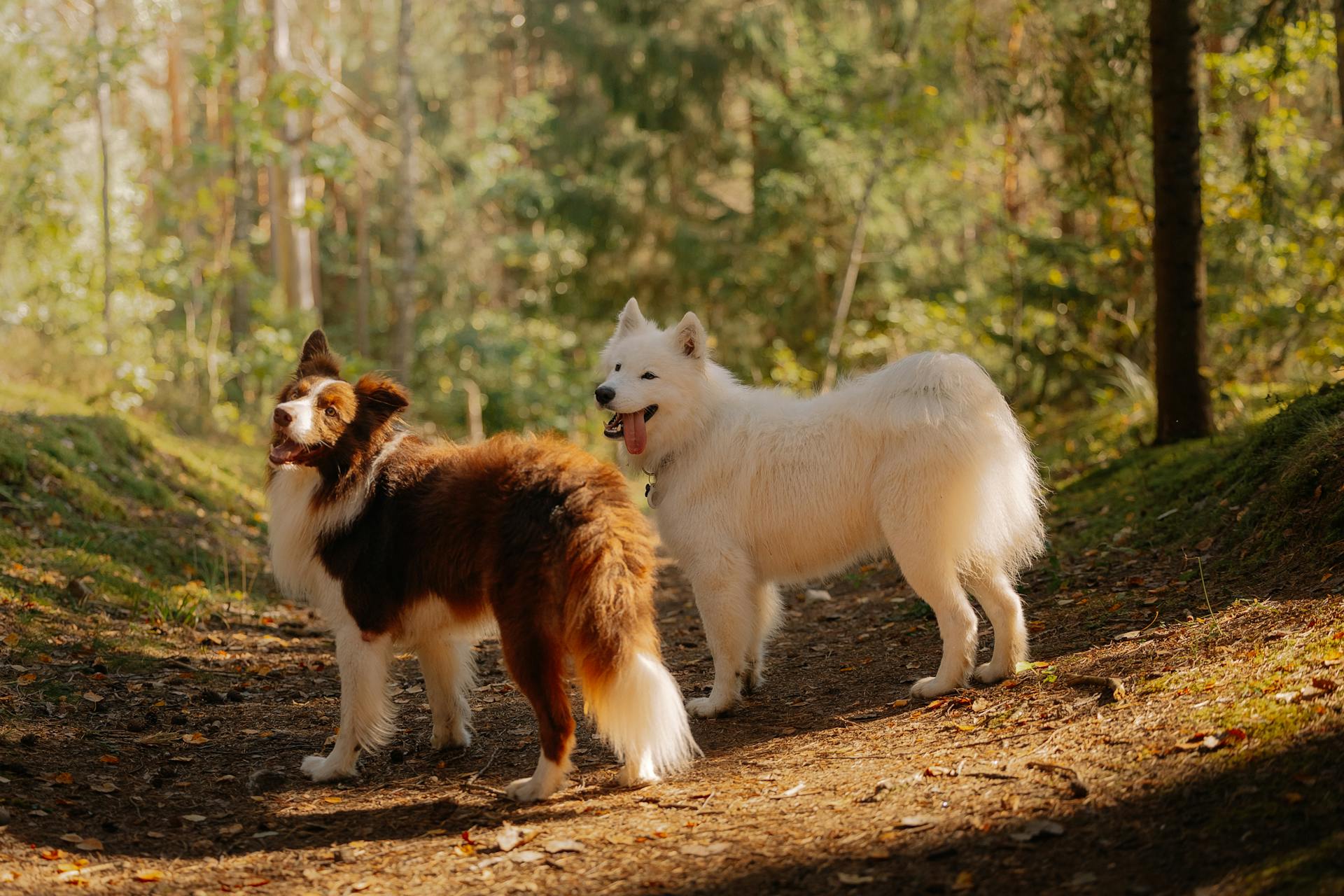
Dogs can catch worms through contaminated feces, often by sniffing or ingesting infected stool.
Puppies are particularly vulnerable to worm infestations due to their immature immune systems.
Dogs can also get worms from eating infected rodents, which can carry parasite eggs in their intestines.
Parasite eggs can remain viable in the environment for years, waiting to infect a new host.
How Dogs Get Worms
Dogs can get worms from external parasites like fleas, which carry tapeworms inside them.
Eating an infected flea is a rare way for a dog to get tapeworms, but it's not impossible.
Hookworms, on the other hand, can infect dogs through skin contact with stool that contains their larvae.
Consider reading: Can Humans Catch Tapeworms from Dogs
Eating Raw Meat
Some tapeworms and flukes can be transmitted when a dog eats raw meat.
These types of worms form cysts in the muscle tissue of animals.
Consuming undercooked or raw meat is a common way for dogs to get infected with these types of worms.
Some dogs might not show any symptoms, but the worms can still cause problems if left untreated.
For more insights, see: Types of Dog Worms Pictures
Eating External Parasites
Tapeworms can be transmitted to dogs through infected fleas that they accidentally ingest.
Dogs may ingest infected fleas while grooming themselves or eating their own fur.
See what others are reading: How Do Dogs Catch Fleas
Through Skin Contact
Dogs can get hookworms by coming into contact with stool that has the larvae in it. This is a common way for dogs to get infected, especially if they're not properly cleaned after an accident.
Hookworms can burrow through the skin and infect the dog. It's a sneaky process that can happen quickly, making it essential to keep an eye on your furry friend's behavior and health.
If your dog has been in contact with contaminated stool, it's crucial to wash their paws and belly thoroughly with soap and water. This can help prevent the hookworms from burrowing into their skin.
Remember, hookworms can cause serious health issues if left untreated, so it's essential to take preventative measures and keep an eye out for any signs of infection.
Additional reading: Can Humans Catch Hookworms from Dogs
Human Travel Routes
When walking with your dog, be aware of potential worm-infested soil.
You can get hookworms from coming into contact with infected soil, such as walking with bare feet.
Hookworm larvae can penetrate the skin and cause "cutaneous larval migrans", an itchy skin disease.
If you accidentally touch fecal material from your dog and then your mouth, you can get roundworms.
Children are at most serious risk, especially if they play in an environment where dog or cat feces may be present.
Roundworm eggs are even more dangerous than hookworms if ingested.
The larvae can migrate almost anywhere in the body, including the liver, lungs, eyes, and brain.
To minimize the risk of getting worms from your dog, maintain strict sanitation principles when pets and children are in close contact.
Discover more: Dogs Gums Bleeding When Chewing Toy
Symptoms and Diagnosis
Dogs can exhibit a range of symptoms if they have worms, and it's essential to be aware of these signs to catch the issue early.
Visible worms in poop, vomiting, diarrhea, weight loss, and lethargy are common symptoms of intestinal worms. Your dog may appear tired and less active than usual.
If you suspect your dog has worms, take a fecal sample to your veterinarian for a proper diagnosis. This involves collecting a sample of your dog's poop and having it examined under a microscope for worm eggs.
A fecal exam is often part of a puppy's first vet visit, and experts recommend treating for roundworms routinely every few weeks due to their high prevalence in young puppies.
Here are some common signs of intestinal worms to watch for:
- Weight loss
- Bloated pot-bellied abdomen
- Abdominal pain
- Poor muscle tone
- Coughing and pneumonia
- Dry, dull skin and coat
- Soft poop or diarrhea
- Blood in the poop (bright red or darker purple)
- Lethargy
- Dehydration
- Anemia and nutritional deficiencies
- Vomiting
- Intestinal blockage
Note that heartworms can present differently, with symptoms like weight loss, exercise intolerance, coughing, and a swollen abdomen.
Symptoms:
Symptoms of worms in dogs can be quite varied, but some common signs to watch for include visible worms in the poop, vomiting, and diarrhea. Sometimes, you might notice worms or white broken sections of the worms in dogs poop, which is a clear indicator of an infestation.

Diarrhea can be a persistent symptom, and it may even contain blood. Worms can lead to malnutrition, causing your dog to lose weight despite a good appetite. If your dog is experiencing weight loss, it's essential to take it seriously, particularly if it's a puppy or has a weakened immune system.
Weight loss is one of the many possible symptoms of intestinal worms, along with a bloated pot-bellied abdomen and abdominal pain. Your dog may also exhibit poor muscle tone, coughing, and pneumonia.
Here are some common symptoms of intestinal worms in dogs:
- Weight loss
- Bloated pot-bellied abdomen
- Abdominal pain
- Poor muscle tone
- Coughing and pneumonia
- Dry, dull skin and coat
- Soft poop or diarrhea
- Blood in the poop (bright red or darker purple)
- Lethargy
- Dehydration
- Vomiting
It's also essential to watch for symptoms specific to heartworms, such as weight loss, exercise intolerance, coughing, and a swollen abdomen.
Diagnosing
Diagnosing worms in dogs can be a bit tricky, but it's essential to catch the problem early on. To diagnose worms, your veterinarian will typically examine a fresh poop sample from your dog. This is usually done by collecting a sample in a poop bag, securing it, and taking it to your vet within 24 hours.
Explore further: How to Collect Urine from a Female Dog

The veterinarian will then look at the stool under a microscope for worm eggs. If you suspect your dog has worms, don't hesitate to consult your veterinarian for a proper diagnosis and treatment plan. Visible worms or segments of worms in your dog's poop can be a clear indicator of an infestation.
Tapeworm segments can sometimes be seen with the naked eye as appearing like segments of rice in the stool or around their anus. In some cases, the fecal sample may not include any eggs, especially if the infestation is light. This is why experts recommend treating roundworms routinely every few weeks in young puppies.
Your veterinarian can look at a fecal sample from your puppy or dog on a prepared slide under a microscope and check for the presence of roundworm eggs. A fecal exam will typically be part of a puppy's first vet visit. To do this, your veterinarian will mix a stool sample with a special solution and then use centrifuge to bring the eggs to the top of the liquid.
Here are some common signs to watch for if you suspect your dog has worms:
- Visible worms or white broken sections of the worms in dogs poop
- Vomiting, often containing worm fragments
- Persistent diarrhea, sometimes with blood
- Weight loss despite a good appetite
- Lethargy
Early diagnosis is vital for your pet's health and to prevent environmental contamination. Many veterinarians include the stool check as part of routine health examinations, so be sure to take advantage of this.
For more insights, see: Dog Health News
Treatment and Prevention
Deworming medications are prescribed by a veterinarian to treat worms in dogs. These medications come in different forms, including tablets, liquids, and powders.
The type of medication used depends on the species and weight of the dog, as well as the type of parasite. Your veterinarian will determine which medication is best for your dog.
Giving a monthly dewormer to your pregnant dog will prevent transmission to her offspring. Then the puppies can start on a dewormer after they finish weaning.
Regular deworming is essential to keep your dog healthy. The usual protocol is once a month until 6 months of age and thereafter once every 3 to 4 months for life.
Using a monthly, commercially-available dewormer can protect against heartworms and intestinal parasites indefinitely. This is because most parasites have a life cycle of three to four weeks.
Here are some steps you can take to deworm your dog:
- Administer preventive deworming medications as recommended by your vet.
- Keep your dog on a regular flea and tick prevention regimen to reduce the risk of vector-borne worm transmission.
- Practice good hygiene by promptly cleaning up your dog's faeces and disinfecting their living area.
- Schedule regular checkups with your veterinarian, who can recommend appropriate deworming protocols based on your dog's age, outdoor-indoor activity levels, and risk factors.
It's also essential to pick up your dog's poop regularly and keep your dog's environment clean to prevent worm infections.
Preventing a Dog from Getting Worms
Preventing a Dog from Getting Worms is crucial to keep your furry friend healthy. Regular veterinary checkups can help identify any potential issues early on.
Your vet can recommend an appropriate deworming protocol based on your dog's age, outdoor-indoor activity levels, and risk factors. This is especially important for puppies and dogs with chronic gastrointestinal issues.
Picking up your dog's poop regularly and keeping their environment clean is essential to prevent the spread of worms. You should also avoid letting your dog get into hazards like dead wildlife or other animals' feces.
Using a monthly, commercially-available dewormer can protect against heartworms and intestinal parasites indefinitely. This is because most parasites have a life cycle of three to four weeks, and regular deworming can prevent and treat most parasites.
Giving a monthly dewormer to your pregnant dog will prevent transmission to her offspring. Then the puppies can start on a dewormer after they finish weaning.
Curious to learn more? Check out: Healthy Mind Canine - Separation Anxiety Training
Here are some key preventive measures to take:
- Regular veterinary checkups
- Proper hygiene (cleaning up your dog's faeces and disinfecting their living area)
- Regular deworming (administering preventive deworming medications as recommended by your vet)
- Flea and tick control (keeping your dog on a regular flea and tick prevention regimen)
- Avoidance of raw meat (be cautious about feeding your dog raw meat, which can increase the risk of tapeworm infection)
Frequently Asked Questions
Are dogs with worms contagious to other dogs?
Yes, dogs with worms can be contagious to other dogs through contact with their feces or contaminated surfaces. Infected dogs can spread roundworm eggs to other dogs through sniffing, licking, or coming into contact with contaminated areas.
Sources
- https://www.merckvetmanual.com/dog-owners/digestive-disorders-of-dogs/gastrointestinal-parasites-of-dogs
- https://www.akc.org/expert-advice/health/worms-in-dogs/
- https://www.petmd.com/dog/general-health/evr_dg_intestinal_worms_in_dogs
- https://www.akc.org/expert-advice/health/roundworms-in-dogs-symptoms-treatment-and-prevention/
- https://in.virbac.com/home/every-advice/pagecontent/every-advice/fleas-ticks-worms/getting-rid-of-worms-in-dogs.html
Featured Images: pexels.com


